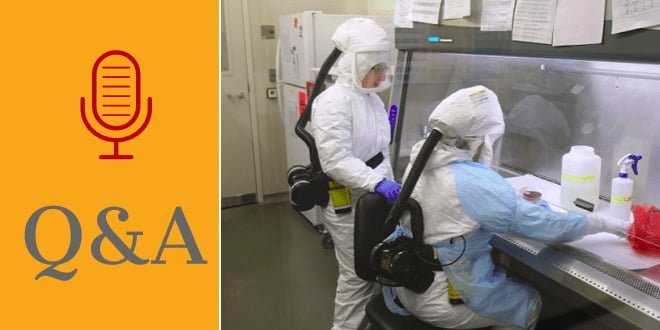Q&A: Russia’s “Lugar lab” Information Offensive
Controversy around the Georgian Healthcare Ministry’s Richard Lugar Center for Public Health Research – previously known as Central Public Health Reference Laboratory – continues, as Russia levels new allegations against this biological research facility, originally established with the U.S. support and funding.
In her recent news briefing on October 10, Russian Foreign Ministry Spokesperson Maria Zakharova claimed, “Russia’s concerns about U.S. military medical-biological activities being “covered up” by the laboratory in Georgia, are fact-based, and undeniable.”
We have approached several former Georgian officials to solicit their views about this ongoing information offensive.
Anna Zhvania, the first Director of the Lugar lab in 2009-2013, says such allegations are not new. She reminds, that then Chief of Russia’s consumer protection agency, RosPotrebNadzor, Gennady Onishchenko was accusing Georgia of carrying out secret experiments back in 2012, while Russian media was releasing fearmongering articles even before the Lugar lab was fully operational.
Zhvania tells Civil.ge that some of the “set pieces” of the Kremlin’s propaganda are crafted for internal audience only. “For example, most of their long pseudo-documentaries are aired on TV in Russia and never fully reach Georgia and the world,” Zhvania said, urging Moscow intends to play with people’s emotions and fears.
She says the laboratory is right to open its doors to scientists and medical professionals from different academic and research establishments from all over the world, to host trainings and welcome journalists “significantly more often than it usually happens” in such facilities. But she thinks “more shall be done to develop strong partnership ties and make Lugar the real center for collaboration” with more international projects running.
“Currently Georgia is in a reactive mode,” says Zhvania. She would wish the center to be more proactive and “to be expressly proud and thankful for the U.S. and international assistance” that goes into functioning of this facility. Zhvania notes, that Russia “has always enjoyed bringing fears and destabilization in Georgian society,” but claims the the target of the Russian offensive “is outside Georgia.”
Like some of Georgian think-tanks and commentators, Zhvania believes the Russian propaganda offensive against Lugar Center is a part of its effort to divert domestic and international attention from its own “chemical troubles” in Salisbury case when Sergei Skripal and his daughter Yulia were allegedly poisoned with a military-grade nerve agent of a type developed by Russia.
Tina Khidasheli, Georgia’s Defense Minister in 2015-2016, thinks Moscow is targeting Georgia and U.S. at the same time. Accusing the two countries of causing “biological, [and] chemical catastrophe,” Khidasheli believes, Russia is targeting the partnership between the two, by painting U.S. as the country making experiments on people on the soil of Georgia – its “satellite country,” pointing out that the colonial patron “fatally exploits” smaller Georgia.
Khidasheli tells Civil.ge that the Georgian Government should be more pro-active in talking about the issues that are “important, useful for the country, good for development.” She worries, that in absence of such communication, “even the vast majority of our population … has just heard about the Lugar laboratory recently,” in the context of Russian allegations.
But Khidasheli says there is a positive story to tell, highlighting an important role the Lugar lab has played in successful implementation of the hepatitis C elimination program.
“Disinformation takes root easier, if sufficient and convincing information is lacking,” Khidasheli stresses, arguing that the Georgian Government “creates a lot of openings [for disinformation] by minimizing the role, contribution and achievements of the West [in Georgia].”
Tamar Kintsurashvili, Executive Director of Media development Foundation, a disinformation watchdog, agrees. She also feels that the officials have been “inert” in dealing with the Kremlin’s efforts.
“Often, the government refrains from expressing its position over some issues, hoping ‘not to irritate Russia’. [Questions over these issues] accumulate during the years which, on one hand, saws doubts in society, and on other hand, encourages Russia to pursue an aggressive [information] policy,” Kintsurashvili told Civil.ge.
She believes the Kremlin aims at fanning fears in Georgia, while “proposing itself as the only power to defeat these fears.” Kintsurashvili also believes there is a linkage with Salisbury case.
Shota Utiashvili, Senior Fellow at the Rondeli Foundation, a security issues think-tank, also believes Russia “invented” accusations against the Lugar lab “after their fiasco in the Skripal case.”
Utiashvili says the Georgian Government “has always been open” concerning this laboratory, and the Russians are well aware of what is happening there.
Utiashvili welcomed the upcoming peer review compliance exercise on November 14-15 with bio-experts participating from more than 20 states, arguing there is nothing more that Georgia should do “to prove that it is not producing any biological and chemical” weapons in that laboratory.
This post is also available in: ქართული Русский
